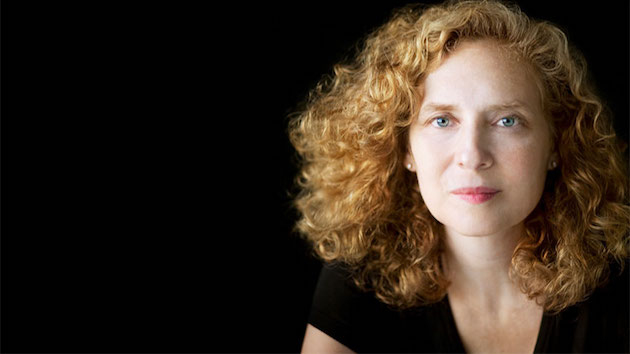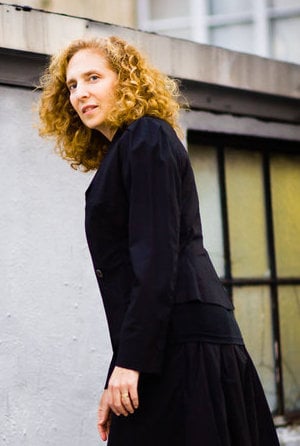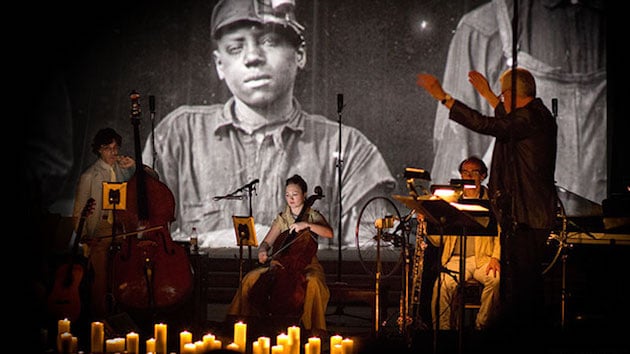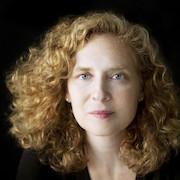
Approximately five decades ago, composer Julia Wolfe asked to be given for her birthday a tool kit and a sewing box. The world might not have known then that she would become a 2016 MacArthur Fellow and winner of the 2015 Pulitzer Prize in music for the powerful oratorio for chorus and sextet, Anthracite Fields, but her maker urge was unmistakable.
“Nobody was very handy,” Wolfe says, about her family. “Because of that, being a craftsman might have fascinated me. I wanted to make things. In the end, the thing I ended up making was music.”
Indeed, the creator impulse vibrated so strongly that instead of simply observing or listening, Wolfe’s relationship to music was visceral, intensely physical. After beginning piano lessons in first grade — “We thought of the piano as a nice piece of furniture, but I took to it,” she says — Wolfe began making up tunes while practicing classical pieces and playing songs from musicals. Her mother would join in, singing the lyrics. Her grandmothers enjoyed the impromptu “shows” that were more about warmth and sharing than about performing.
“Music was an amazing vehicle with which to make something expressive,” she recalls. “In high school, I dropped the lessons and played on my own. I’d elaborate on existing pieces. I took dance classes, put rock ’n’ roll on the record player and loved moving to music. It was really in my body: feeling the rhythms and responding to music physically.”
There was Led Zeppelin, Joni Mitchell, Brahms lullabies, Beethoven and Mozart etudes. When she picked up the guitar, folk music streamed into the mix. The genre introduced Wolfe to new textures and rhythms, and spawned a fondness for “common” instruments like the mountain dulcimer that in some way sounds like home to a musician who grew up in the Appalachian region that includes her hometown, Montgomeryville, Pennsylvania.

In the family, a strong work ethic was pervasive — her father was the first in his family to attend college and became a physician; her mother was a schoolteacher, before staying at home to raise her children. “My parents grew up poor and made their way to a different environment. We were not a happy-go-lucky, vacation-type family. I’m a workaholic because of that strong work value.”
By the time Wolfe was a college student enrolled at the University of Michigan, folk music was entrenched almost like DNA in her musicianship. She formed a string quartet that included the “crying sound” of a mountain dulcimer and wrote songs in her dorm room. “There’s a performance energy and a freedom of sound to folk music. It’s not about being careful, it’s about letting it all hang out,” she says.
The study of classical music, a parallel track in her training, provided equally vital, appreciable contrast. “Classical music is about order, perfection, not the body energy of folk music. When you’re training in it, you learn to rein in your physical body. You’re not throwing that violin around; you’re streamlining. But great performers in classical music have that freedom that folk singers do, it’s just not what you learn as a student.”
Wolfe acted rather like the proverbial sponge during college and in the years since: After “blindly following friends” into a music class and finding her interests sparked by writing rhythmic sketches and short pieces in a class taught by Jane Heirich, she became Heirich’s assistant. “She was a fantastic teacher. She led me on to further study of composition. By the end of my time there, I was writing full evenings of music.”
Collaborating with dance groups, Wolfe gained an ear for George Crumb, Steve Reich, and other minimalist composers known at the time as the “bad boys” of the music industry. The folk scene in Ann Arbor and interactions with theater groups added to Wolfe’s menagerie of instruments and vocal influences: harmonica, bones (picked up from legendary bones player Percy Danforth himself), flute, African drums, and singing with a madrigal choir.
Today, striking a balance between the multiple instrumental and vocal elements in her work is often a high-wire act. It’s a process that involves deep research into the subject of a new work, exploration of raw sounds found in the strings of a cello or double bass, but also in the crash of an industrial machine on a factory floor — and following an instinctive muse during the actual writing of a piece.

Spoken or sung words carry inflections that fascinate Wolfe beyond the illumination of a text or song. Anthracite Fields, which premiered in 2014, she says, still sounds fresh to her ear. “I’m always tweaking. I changed some orchestrations, so it has had evolutions. I think it’s done now, but it was wonderful to hear it and make adjustments. It was, in terms of my own work, indicative of where I’m at in terms of voices: wanting to write something very clear. It’s the most developed choral writing that I’ve done.”

Anthracite Fields will be presented by Cal Performances Feb. 26 at Zellerbach Hall. The chamber ensemble Bang on a Can All-Stars, cofounded by Wolfe, David Lang, and Wolfe’s husband, Michael Gordon, will be joined by Cappella SF. The hour-long piece tells the story of Pennsylvania coal miners and their families at the turn of the 20th century. Oral histories, political text, and ballads in five movements embrace classical and folk traditions colored with rock ’n’ roll energy, the spontaneity of jazz, and new music open-mindedness that integrates appliance sounds and a speech by longtime United Mine Workers of America leader John L. Lewis. Accompanying scenography and projections by designer Jeff Sugg roll in slow motion, meditatively morphing from the opening, quintessential image of a miner to include other faces, archival film, and documents. “There’s a minimalist quality to it,” says Wolfe. “I want people to look at the singers and musicians as well as Jeff’s environment.”
Duality is an aspect of her compositions in general, she says.
I definitely think about tension. Building and releasing it. I like to work with energy shifts. That said, it’s powerful to have a one-energy piece, driving from beginning to end. Others have space, stillness. In a sense, I’m trying to hold you with me, the whole time. You can lose tension if you make the mistake of thinking loud and noise are exciting. There are harmony, pitch, density and texture that I’m always thinking about. It’s very personal, but I’m definitely thinking about those things while composing.
Lately, in the back — and even the forefront — of her mind, the current political climate is ever-present. Allowing herself to get into populist subjects like the coal industry and garment workers — the topic of her next, in-progress project — and writing ballads telling stories about people who wake up and go to work, she says, is in itself a political stance. “It’s about us. Everyday people, not mystical, magical heroes.”
Responding specifically to current events and her role as an artist after last year’s presidential campaign, she says, “It’s a complex answer. A part of me is distraught. But you always work through that and I’ve found comfort in creating music. What I don’t want to do is become choked up. I can be a news junkie, so it can be overwhelming. You have to find balance: you can’t put your head in the sand. What I find empowering is taking control of what we want to talk about and not just being reactive because it’s come from the top or from a tweet. We have to harness our values.”
Telling poetic stories, Wolfe says, might be the best response she can offer as an artist. “The audience is smart. They can put the pieces together and draw from it what they want. Obviously, I have a statement. But it’s that if we are a part of a conversation, we have responsibility. As we get closer to an issue, we see things aren’t black and white. I look for the humanity.”

